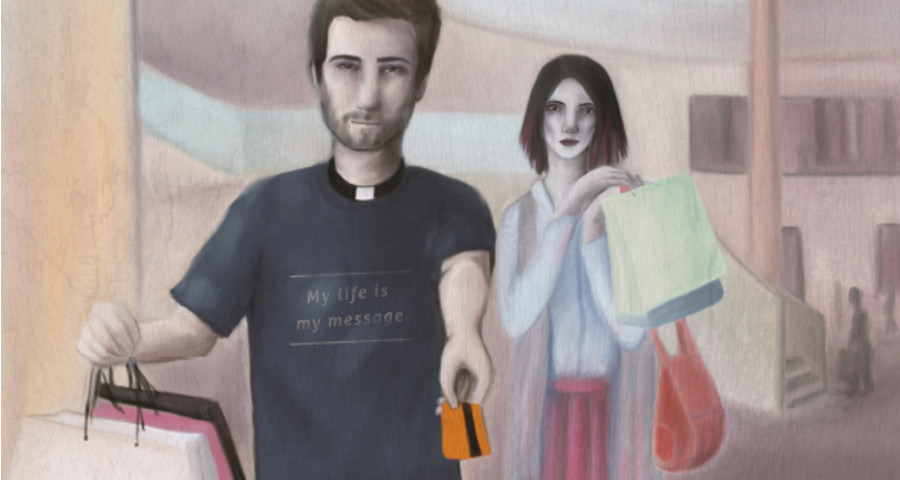Despite growing up in the Anglican Church, my awareness of the liturgical calendar—the yearly cycle of Christian seasons and holy days—has been decidedly minimal. As a child I knew when Christmas was, of course, but perhaps more from self-interest than piety. I remembered Easter always fell early in the year, but the first I knew of Palm Sunday was generally upon walking in to see the church decked out with fronds.
My wife Andi’s experience has been a little different: growing up, her family regularly gave up chocolate during Lent, using the desire for it to prompt reflection on the gift of Jesus’ life, death, and resurrection.
In early 2024, Andi suggested bringing Lent observance into our new family together. The problem? I don’t eat much chocolate, and both of us already fell somewhere between vegetarian and vegan when it came to food. Neither of us really drink alcohol either, so we couldn’t meaningfully give up dairy, meat, fish, or alcohol. Given a full solid food fast seemed beyond us, what else could we give up for forty days which would practically help us direct our energy and attention to God?
After tossing a few ideas around, we soon had our answer: acquisition. ‘Acquire nothing for forty days’: that became our fast for Lent. Importantly, for us this had to include not just new items but anything not already ours, apart from groceries. For years we have both prided ourselves on buying relatively little that is completely new, favouring op shops and liberating other people’s ‘rubbish’ instead. (A common date night for us is walking our local streets digging through piles of miscellany left on nature strips.) However, we realised that while this approach neatly side-steps the various ethical and environmental questions associated with new purchases, it still allowed us to retain—unchallenged—the same fundamentally consumerist maxim underpinning our wider economic culture: that acquisition leads to life. Our behaviour still suggested that deep-down we suspected life may actually consist in the abundance of possessions after all, or at least in the thrill of acquiring something new.
On top of this, we were married only a few months earlier and, while we had tried to moderate the influx of extravagant gifts which has become the nuptial norm, we still felt ourselves to be glutted with sheer STUFF. Was this the precedent we wanted to set for our marriage going forward? (Listen to MannaCast ep. 9 for further discussion of the challenges of trying to live with less).

What was it like?
Initially, for both of us, it was hard. This in itself was telling. We would walk past op shops or roadside dumps and really feel the pull: we wanted to look. We wanted to know what goodies might be awaiting discovery which we could take home and thereby (presumably) enrich our lives even further. We suffered from withdrawal of a sort: we felt we were missing out. As the days turned to weeks though, this sense of craving steadily diminished to a point where our fast became tangibly freeing instead. If you simply can’t do it then you don’t have to think about it: you can walk on by, content with the abundance you already have. Simply the strength of the desire we experienced at the beginning gave much spiritual food for thought: if we have enough, why do we seek more? Is acquisition really going to bring us the life we crave and hope for?
Our self-imposed restriction also begot creativity. We were midway through setting up a house together when Lent began: what now? This issue presented particularly memorably in the form of a bright lamp with no shade. We were too late to buy one, so we got experimenting. Jar? No. Piece of cloth? Not quite. Orange plastic lunchbox carefully balanced on top? Close enough… Close enough that even now—a year on—we are yet to replace it; it has even become something of a memento of the experience! In this and other ways, we both quickly embraced the creativity of make-do solutions, something which our culture tends to squash. It became a new kind of game: can we get this done with just the things we have? Our world of advertising and cheap consumer goods teaches us to solve our problems with products and paid services rather than our God-given minds, hands, and the things already around us, but this drastically reduces our sense of our own usefulness to ourselves and others.
Moreover, it is commonly observed that communities tend to be strongest where there is some level of tangible mutual dependence. The more we simply purchase solutions to our problems instead of seeking the help of those around us, the more we can inadvertently undermine our commitment to these relationships, especially when they become hard or complicated.
Very occasionally over the forty days we bent the rules: what do you do about a spontaneous gift given in ignorance of our fast, for example? Politely accept (but don’t use it yet) became the answer. Was Jacob allowed to scrounge odd pieces of wood from his Dad’s shed collection to build a quiver for his arrows...? Yes, but just this once (everything else came from his own personal hoard of impedimenta).

It is commonly observed that communities tend to be strongest where there is some level of tangible mutual dependence.




Finally, we both quite quickly discovered that, in our case, simply deciding to treat what we already have as enough goes a long way to making it so. We even started looking at our existing belongings differently: without the distraction of novelty, we spent more time contemplating afresh some the many possessions we had forgotten about or been ignoring for years. Because of this, we began to experience the burden of owning as the other side of acquiring: once something is in your life it becomes something you have to manage—to maintain, or organise, or keep somewhere. After a certain point, having carries a hidden cost. (Other costs are more apparent, with self-storage in Australasia representing a $2 billion industry, and growing!)

Outcomes and take-aways
Surprisingly, once the fast was over we didn’t feel a sudden wave of relief and immediately rush out to buy stuff like we expected. Instead, having gone forty days without a toaster, we found we didn’t actually need one (a sandwich press will do the job just as well). Having got out of the habit or acquiring, we felt more able to judge the difference between our ‘needs’ and ‘wants’. Even things we did feel the need of, such as a decent bicycle pump, we were a bit sluggish in seeking. So, for those considering a similar fast, be warned: you might enjoy shopping less afterwards!
Realising anew how much useful stuff we already had also led us to set up a sharing network at our church. Essentially, it’s an online document listing all the things and skills community members have which they are happy to offer to others free of charge. Want to go kayaking but don’t want to own a boat? No worries. Indoor plant cuttings? Got you covered. Need a baby sitter or a maths tutor? Check the list. Want to borrow a sewing machine or a food processor? It’s there. Woodworking tools? Hiking gear? Gardening advice? Yup. And so much more!
Overall, we ended our season of Lent newly grateful for this beautiful part of our faith tradition. Now, whenever we feel the tug of acquisition we also feel a prompt to reflect again on God’s provision and love for us. In our world, it’s particularly easy to lose sight of commands like Hebrews 13:5:
Keep your lives free from the love of money and be content with what you have, because God has said, “Never will I leave you; never will I forsake you.”
For us, Lent has helped us realign our behaviour and attitudes with God’s commands and promises.

